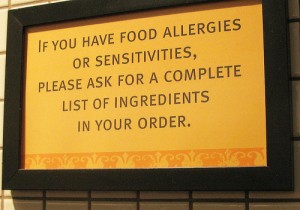 As of December 14th, 2014 restaurants, fast food outlets and take away food services across Europe will be required by law to tell customers if their products contain one of 14 ingredients known to trigger allergic reactions.
As of December 14th, 2014 restaurants, fast food outlets and take away food services across Europe will be required by law to tell customers if their products contain one of 14 ingredients known to trigger allergic reactions.
Under the new legislation (EU FIC Food Information for Consumers Regulation), customers must be told if their food contains any of the following:
- celery – including any found in stock cubes and soup
- cereals containing gluten – including spelt, wheat, rye, barley
- crustaceans – eg crabs, lobster, prawns and shrimp paste
- eggs – including food glazed with egg
- fish
- lupin – can be found in some types of bread, pastries, pasta
- milk
- molluscs – mussels, land snails, squid, also found in oyster sauce
- mustard
- nuts – for example almonds, hazelnuts, walnuts, macadamia
- peanuts – also found in groundnut oil
- sesame seeds – found in some bread, houmous, tahini
- soya – found in beancurd, edamame beans, tofu
- sulphur dioxide – used as a preservative in dried fruit, meat products, soft drinks, vegetables, alcohol.
With an estimated 17 million Europeans suffering from some kind of food allergy, the move has been welcomed by sufferers and the medical profession.
There has been no direction on how the information has to be conveyed to the customers, and some people feel this is going to cause confusion. Suggestions include discussing the ingredients in certain dishes with customers, leaflets or by highlighting the possible allergens on menus.
Resources:
The Pantry Primer: How to Build a One Year Food Supply in Three Months
The Prepper’s Blueprint: The Step-By-Step Guide To Help You Through Any Disaster
Wheat Belly: Lose the Wheat, Lose the Weight, and Find Your Path Back to Health
GMO Free Diet: How to stay healthy by identifying and avoiding dangerous foods
